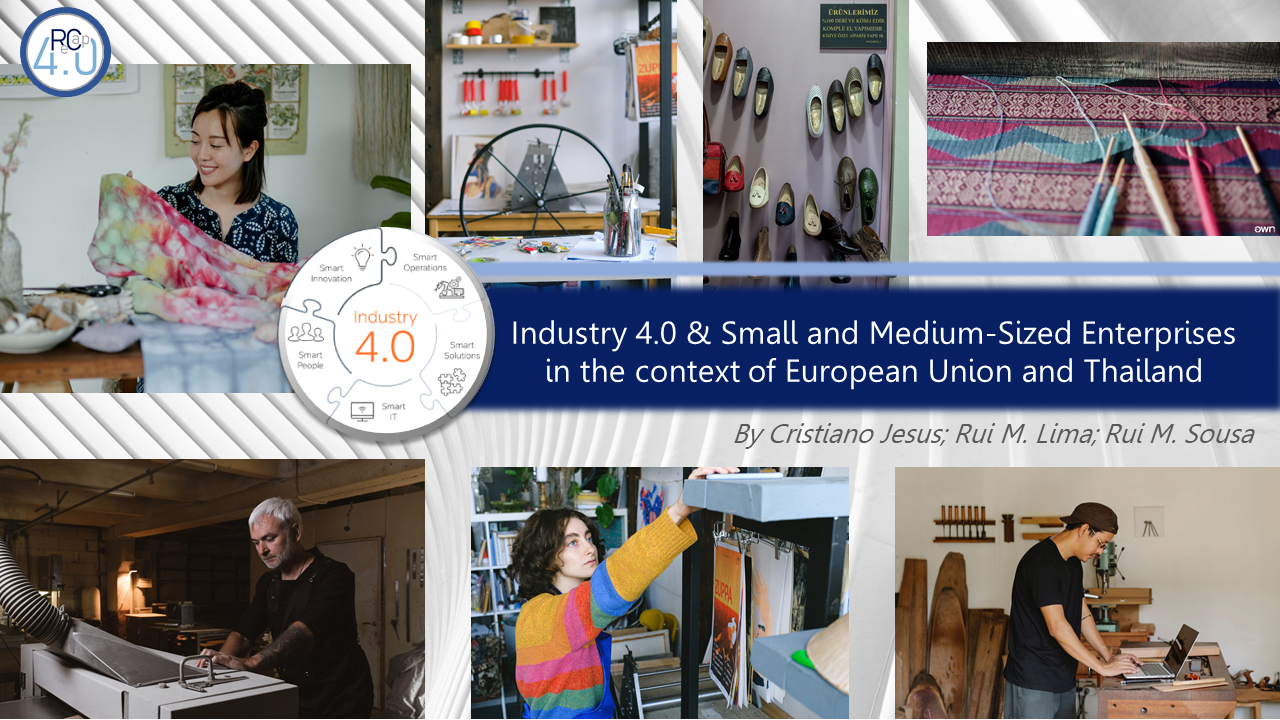
By Cristiano Jesus; Rui M. Lima; Rui M. Sousa
University of Minho, ALGORITMI Centre, Production and Systems Department – Guimarães, Portugal
———————————————————————————————————–
The reconfiguration of business models to the Industry 4.0 is an urgent demand and a clear concern that emerges from current economic relations. However, the concepts of Industry 4.0 and the ways of implementation in various contexts are not yet assimilated at all by the agents of the productive sector.
In addition, scientific researches often present solutions that are too generic, so that the Small and Medium-Sized Enterprises (SME), in turn, find difficult to recognize those solutions as applicable in their particular reality. There are some important findings reported by recent scientific publications, namely:
• Existing models have in common the fact that they are not geared to specific situations, so that they can only be applied by hiring external consultancy;
• Many studies present solutions that have a greater emphasis on technology;
• Many other studies argue that the best results occur from approaches that involve BPI – Business Process Improvement, BPM – Business Process Management and Maturity Models for a realistic and progressive reconfiguration of the business model and the organizational culture;
• SMEs are not always able to perceive any relationship between their activities and the definition of Industry 4.0 presented both in scientific studies, consulting services as well as and in the big media – Newspaper, Magazines, Blogs, etc.
According to OECD – Organization for Economic Cooperation and Development (2020), 99.7% of the companies in Thailand are SMEs. In Ireland, the CSO – Central Statistics Office informs that 99.7% of enterprises are SMEs and in Portugal, the Francisco Manuel dos Santos Institute considers that this index reaches 99.9% of Portuguese business organizations. Therefore, the social and economic importance of this sector is undeniable.

As for the context of Portugal in the European Union, for example, data from the World Economic Forum (WEF) indicates that the evaluation of Readiness for the Future of Production places Portugal among the countries with high potential of development with significant possibilities to be among the leading countries in this process. In order to identify the areas of greatest impact for the application of Industry 4.0 solutions and implementation models, the investigation of reports from local associations and working groups revealed that (i) most large companies in Portugal already have Industry 4.0 implementation projects; (ii) 75% have well-defined strategy and leadership for this implementation; (iii) 20% have isolated initiatives managed by several departments, and; (iv) only 5% have no ongoing initiative.
As previously mentioned, SMEs do not have the perception that this topic concerns them, nor that in their businesses there is some possibility of applying Industry 4.0, largely because they almost always relate Industry 4.0 exclusively to Artificial Intelligence, Virtual Reality, Machine Learning, Big Data, etc.
Therefore, any improvement in SMEs can bring significant progress in the conditions presented by Portugal. This is where the opportunities for improvement are found, since among the large companies this work has already been done, of course with opportunities for improvement. According to WEF, this scenario is similar in all world, as can be seen in its reports.
It is usual to mention the worry about labor qualification when the topic of discussion is Industry 4.0. Concerning this, it is important to consider a factor that is present in Portugal as well as in many other countries. Portuguese universities have quality and perform the practice of updating their academic projects regularly, including in the topic of Industry 4.0. Therefore, Portugal does not have a problem with qualified labor; the problem is that professionals are more interested in working in large companies, or even outside Portugal.
Portugal, in particular, has a high potential and adequate structural conditions, but relative difficulty in retaining talent, low confidence in professional and scientific management, and low professional mobility. Labor mobility refers to the capacity of personnel to move between positions, organizations and regions, within an economy and between different economies. This indicator is important because it affects growth and production. Large companies have their own resources, but SMEs cannot attract qualified labor and have difficulties to recognize themselves in the universe of Industry 4.0.
To conclude, it can be stated that SMEs do not recognize that Industry 4.0 is applicable to their business, but any developments in these companies have the potential for high economic and social impact.
There is a need for implementation models designed to meet their specificities and action for the development in these companies of a culture of valuing professional and scientific management. The companies need to be willing for professionalizing not only operations but also strategies and concepts of management, employing qualified professionals and developing a new organizational culture by adopting policies of permanent development of new competences dedicated to current staff.
Usually SMEs have neither the knowledge nor the financial conditions to count on consulting services. Therefore, applied research or targeted actions of higher education institutions have a great importance in this context.
———————————————————————————————————–
References
CSO. Small and Medium Enterprises. Central Statistics Office. https://www.cso.ie/. Accessed 9 Jul 2021.
Jesus, C., & Lima, R. M. (2022). Study of the Portuguese Challenges in the Context of European Union to Identify Adaptation Strategies for the Industry 4.0. Em J. Machado, F. Soares, J. Trojanowska, & V. Ivanov (Eds.), Innovations in Industrial Engineering (pp. 25–35). Springer International Publishing. https://doi.org/10.1007/978-3-030-78170-5_3
OECD. Thailand – Financing SMEs and Entrepreneurs 2020: An OECD Scoreboard. https://www.oecd-ilibrary.org/. Accessed 9 Jul 2021.
Pordata. Retrato de Portugal na Europa. Fundação Francisco Manuel dos Santos. https://www.pordata.pt/. Accessed 9 Jul 2021.
WEF. Reports. World Economic Forum. https://www.weforum.org/reports/. Accessed 9 Jul 2021.
.
